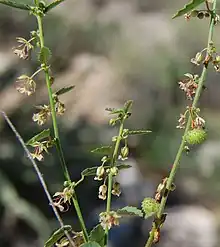Ayenia
Ayenia is a genus of flowering plants in the mallow family, Malvaceae. It includes 216 species[2] of subshrubs, shrubs, small trees, and lianas.[3] They are native to the tropical Americas and southwestern United States, tropical Africa, and tropical Asia.[2]
| Ayenia | |
|---|---|
 | |
| Ayenia compacta | |
| Scientific classification | |
| Kingdom: | Plantae |
| Clade: | Tracheophytes |
| Clade: | Angiosperms |
| Clade: | Eudicots |
| Clade: | Rosids |
| Order: | Malvales |
| Family: | Malvaceae |
| Subfamily: | Byttnerioideae |
| Tribe: | Byttnerieae |
| Genus: | Ayenia L. (1756)[1] |
| Species | |
|
216; See text. | |
| Synonyms[2] | |
| |
Description
Ayenia includes subshrubs, shrubs, small trees, and lianas. The genus is distinguished by its tiny yet extraordinarily complex flowers.[3]
Ecology
Species of Ayenia grow in diverse habitats, from open areas in dry and seasonally-dry regions to humid forests, river banks, and from lowlands to high elevations.[3]
Byttneria species are host plants to insects such as beetles of the genus Lonchophorellus.[4]
Taxonomy
Ayenia, Byttneria, and Rayleya were formerly described as separate genera, with Ayenia having a Neotropical distribution, Byttneria as a Pantropical genus, and Rayleya as a monotypic genus with a single Brazilian species, Rayleya bahiensis. A phylogenetic analysis found that Byttneria was paraphyletic and Ayenia was nested within it, and Rayleya was a sister clade to the others.[3] In 2018 Christenhusz and Byng transferred the Byttneria and Rayleya names to Ayenia, which had nomenclatural priority.[5]
Selected species
216 species are currently accepted.[2] Selected species include:
|
|
References
- "Taxon: Ayenia L." Germplasm Resources Information Network. United States Department of Agriculture. 2003-06-05. Retrieved 2011-02-20.
- Ayenia L. Plants of the World Online. Retrieved 26 June 2023.
- Whitlock, B. A., & Hale, A. M. (2011). The phylogeny of Ayenia, Byttneria, and Rayleya (Malvaceae s.l.) and its implications for the evolution of growth forms. Systematic Botany, 36(1), 129-136.
- Clark, W. 1989. Lonchophorellus Clark, un nuevo género de Anthomini neotropical (Coleoptera: Curculionidae). Archived 2016-03-11 at the Wayback Machine The Coleopterists Bulletin v. 43, no. 3 p. 279-289.
- Dorr, L.J. 2023. New combinations in Ayenia (Malvaceae, Byttnerioideae) for the flora of Ecuador. Phytoneuron 2023-04: 1– 5. Published 17 February 2023. ISSN 2153-733X
External links
 Data related to Ayenia at Wikispecies
Data related to Ayenia at Wikispecies Media related to Ayenia at Wikimedia Commons
Media related to Ayenia at Wikimedia Commons- Jepson Manual Treatment
- USDA Plants Profile